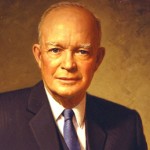 Dwight D. Eisenhower (1890-1969) was president of the United States between January 1953 to January 1961, a period of growing interest and involvement in Vietnam. Eisenhower was born in Texas, raised in Kansas then educated at the West Point military academy, graduating in 1915. During World War I, he was involved in training other soldiers in tank warfare. Eisenhower reached the rank of general during World War II, where he was best known for commanding the Allied landings on D Day (June 1944). After the war, he served as US Army chief of staff and commander of NATO forces in Europe. In 1952 Eisenhower ran as the Republican candidate for the presidency; his popularity as a war hero helped him secure an easy victory.
Dwight D. Eisenhower (1890-1969) was president of the United States between January 1953 to January 1961, a period of growing interest and involvement in Vietnam. Eisenhower was born in Texas, raised in Kansas then educated at the West Point military academy, graduating in 1915. During World War I, he was involved in training other soldiers in tank warfare. Eisenhower reached the rank of general during World War II, where he was best known for commanding the Allied landings on D Day (June 1944). After the war, he served as US Army chief of staff and commander of NATO forces in Europe. In 1952 Eisenhower ran as the Republican candidate for the presidency; his popularity as a war hero helped him secure an easy victory.
Eisenhower’s Cold War policies were firm but cautious. He sought to contain communist expansion while easing tensions and avoiding direct confrontation. He was determined to prevent Vietnam from falling into communist hands, seeing this as a threat to all of south-east Asia. Eisenhower’s administration funded the French in their struggle against the Viet Minh, though the president harboured concerns about returning the French to Vietnam as a neo-colonial power. In 1954 Eisenhower refused to intervene to save the French garrison at Dien Bien Phu, ignoring the advice of vice president Richard Nixon, Secretary of State John Foster Dulles and his military chiefs. After the French defeat, Eisenhower’s administration refused to sign the Geneva Accords or abide by their resolutions. Eisenhower also backed the formation of South Vietnam as a separate state and the instalment of Ngo Dinh Diem as its pro-Western leader. Eisenhower supported Diem through the 1950s, despite strong misgivings about Diem’s anti-democratic and often brutal methods.
Eisenhower retired in January 1961, handing the presidency to John F. Kennedy. During Eisenhower’s two terms the US had been drawn into Vietnam, first as a benefactor to the French, then as a supporter of the Diem regime in Saigon. Eisenhower’s defiance of the Geneva Accords and his involvement in Vietnam left a difficult legacy for the three presidents who followed him. Eisenhower lived out his remaining years in Pennsylvania, sometimes speaking publicly in support of US military involvement in Vietnam. He died in March 1969.
© Alpha History 2018. Content on this page may not be republished or distributed without permission. For more information please refer to our Terms of Use.
This page was written by Jennifer Llewellyn and Steve Thompson. To reference this page, use the following citation:
J. Llewellyn & S. Thompson, “Dwight D. Eisenhower”, Alpha History, accessed [today’s date], https://alphahistory.com/vietnamwar/dwight-d-eisenhower/.
